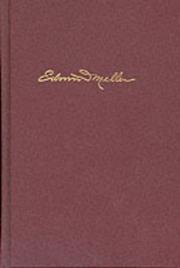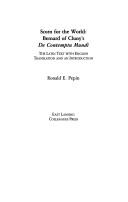| Listing 1 - 10 of 12 | << page >> |
Sort by
|

ISBN: 0889463166 9780889463165 Year: 1988 Volume: 2 Publisher: Lewiston Mellen
Abstract | Keywords | Export | Availability | Bookmark
 Loading...
Loading...Choose an application
- Reference Manager
- EndNote
- RefWorks (Direct export to RefWorks)
Verse satire, Latin (Medieval and modern) --- History and criticism. --- -Latin verse satire, Medieval and modern --- Medieval Latin verse satire --- Modern Latin verse satire --- Latin poetry, Medieval and modern --- History and criticism --- -History and criticism --- -Latin poetry, Medieval and modern --- Latin verse satire, Medieval and modern --- Verse satire, Latin (Medieval and modern) - History and criticism.
Book
ISBN: 0823228924 0823248623 Year: 2008 Publisher: Fordham University Press
Abstract | Keywords | Export | Availability | Bookmark
 Loading...
Loading...Choose an application
- Reference Manager
- EndNote
- RefWorks (Direct export to RefWorks)
Book
Year: 1975 Publisher: New York (N.Y.): Fordham university press
Abstract | Keywords | Export | Availability | Bookmark
 Loading...
Loading...Choose an application
- Reference Manager
- EndNote
- RefWorks (Direct export to RefWorks)
Book
ISBN: 9780879071226 9780879071271 Year: 2023 Publisher: Collegeville Cistercian Publications
Abstract | Keywords | Export | Availability | Bookmark
 Loading...
Loading...Choose an application
- Reference Manager
- EndNote
- RefWorks (Direct export to RefWorks)
"A collection of 754 brief narratives, The Dialogue on Miracles is a translation of Caesarius of Heisterbach's Dialogus miraculorum. While these narratives, or exempla, were written primarily to pass on the moral teaching of the Bible and the Cistercian tradition to young monks, they provide modern readers a window into not only the lives of the first generations of Cistercian monks and nuns, but also of medieval German society and culture, secular and religious"-- Caesarius was a monk at the Cistercian monastery of Heisterbach in Germany, where he served as Master of novices. For their instruction and edification, he composed his lengthy Dialogue on Miracles in twelve sections between 1219 and 1223. The many surviving manuscripts of this and other works by Caesarius attest to his stature in the history of Cistercian letters. This second volume contains sections seven through twelve of Caesarius of Heisterbach's Dialogue on Miracles, the first complete translation into English of an influential representation of exempla literature from the Middle Ages.
Miracles --- Exempla --- Caesarius,
Book
ISBN: 9780823293315 Year: 2022 Publisher: New York, NY
Abstract | Keywords | Export | Availability | Bookmark
 Loading...
Loading...Choose an application
- Reference Manager
- EndNote
- RefWorks (Direct export to RefWorks)

ISBN: 0937191353 9780937191354 Year: 1991 Volume: 8 Publisher: East Lansing Philosophy of science association
Abstract | Keywords | Export | Availability | Bookmark
 Loading...
Loading...Choose an application
- Reference Manager
- EndNote
- RefWorks (Direct export to RefWorks)
Christian poetry, Latin (Medieval and modern) --- Theological anthropology --- Christianity --- -Man (Christian theology) --- -Theology --- -Christian theology --- Theology --- Theology, Christian --- Religion --- Man (Christian theology) --- Latin Christian poetry, Medieval and modern --- Latin poetry, Medieval and modern --- Translations into English --- Poetry --- History --- -Poetry --- Translations into English. --- Poetry. --- -Translations into English --- Christian poetry, Latin (Medieval and modern). --- -Latin Christian poetry, Medieval and modern --- Christian theology --- Anthropology, Doctrinal --- Anthropology, Theological --- Body and soul (Theology) --- Doctrinal anthropology --- Humanity, Doctrine of --- Man, Doctrine of --- Man (Theology) --- Mankind, Doctrine of --- Christian poetry, Latin (Medieval and modern) - Translations into English --- Theological anthropology - Christianity - Poetry.
Multi
ISSN: 03160874 ISBN: 9780888442987 088844298X Year: 2009 Volume: 46 Publisher: Toronto, Ont. Pontifical Institute of Mediaeval Studies
Abstract | Keywords | Export | Availability | Bookmark
 Loading...
Loading...Choose an application
- Reference Manager
- EndNote
- RefWorks (Direct export to RefWorks)
Anselm of Canterbury --- Thomas of Canterbury --- Christian saints --- Saints chrétiens --- Biography --- Biographies --- Anselm, --- Thomas, --- Catholic Church --- Bishops --- Biography. --- Anselme, --- Église catholique --- Évêques --- Saints chrétiens --- Saints --- Canonization --- Becket, Thomas à, --- Becket, Thomas, --- Thomas --- Anselmus, --- Anzelm, --- Anselmo, --- Ansèlm, --- Anshelmus, --- Anselm --- Anselmus Cantuariensis --- Anselme d'Aoste --- Anselme de Cantorbéry --- Anselmus van Canterbury --- Anselmus --- Church of Rome --- Roman Catholic Church --- Katholische Kirche --- Katolyt︠s︡ʹka t︠s︡erkva --- Römisch-Katholische Kirche --- Römische Kirche --- Ecclesia Catholica --- Eglise catholique --- Eglise catholique-romaine --- Katolicheskai︠a︡ t︠s︡erkovʹ --- Chiesa cattolica --- Iglesia Católica --- Kościół Katolicki --- Katolicki Kościół --- Kościół Rzymskokatolicki --- Nihon Katorikku Kyōkai --- Katholikē Ekklēsia --- Gereja Katolik --- Kenesiyah ha-Ḳatolit --- Kanisa Katoliki --- כנסיה הקתולית --- כנסייה הקתולית --- 가톨릭교 --- 천주교 --- Thomas Cantuariensis --- Christian saints - England - Canterbury - Biography. --- Saints chrétiens - Angleterre - Canterbury - Biographies. --- Anselm, - Saint, Archbishop of Canterbury, - 1033-1109. --- Thomas, - à Becket, Saint, - 1118?-1170. --- Anselme, - saint, archevêque de Canterbury, - 1033-1109. --- Thomas, - Becket, saint, - 1118?-1170.
Book
ISBN: 9780674060029 0674060024 Year: 2011 Volume: 9 Publisher: Cambridge (Mass.) : Harvard university press,
Abstract | Keywords | Export | Availability | Bookmark
 Loading...
Loading...Choose an application
- Reference Manager
- EndNote
- RefWorks (Direct export to RefWorks)
Satire, Latin (Medieval and modern) --- Latin poetry, Medieval and modern --- Satire latine médiévale et moderne --- Poésie latine médiévale et moderne --- Translations into English --- Translations into English. --- Traductions anglaises --- Latin poetry, Medieval and modern. --- Satire, Latin (Medieval and modern). --- Satire latine médiévale et moderne --- Poésie latine médiévale et moderne
Book
ISBN: 9780879073220 0879073225 9780879079376 9780879072308 9780879076931 Year: 2010 Publisher: Athens Cistercian Publications/
Abstract | Keywords | Export | Availability | Bookmark
 Loading...
Loading...Choose an application
- Reference Manager
- EndNote
- RefWorks (Direct export to RefWorks)
The period between 1025 and 1150 was a time of creativity and new beginnings in monastic life. Robert of La Chaise-Dieu and Stephen of Obazine established two very successful monastic families in the neighboring regions of the Auvergne and Limousin respectively. La Chaise-Dieu became the head of a vast Benedictine congregation; Obazine had a number of dependencies. With them it joined the Cistercian Order in 1147. The saintly lives of these two founders, recounted by near contemporaries and here translated into English for the first time, unfolded against a backdrop of political unrest and lawlessness. While devoting themselves to monastic life according to the Rule of St. Benedict, these communities served the poor and uprooted. Both reformer monks are models and inspiration for our era, which too calls for creativity and new beginnings. "This volume offers translations of the twelfth-century Latin vitae of four monks of the Monastery of Savigny: Abbot Vitalis, Abbot Godfrey, Peter of Avranches, and Blessed Hamo. Founded in 1113 by Vitalis of Mortain, an influential hermit-preacher, Savigny expanded to a congregation of thirty monasteries under his successor Godfrey (1122-1138). In 1147, the entire congregation joined the Cistercian Order. Around 1172, two monks of Savigny, Peter of Avranches and Hamo, friends but very different personalities, died. Their stories were told in two further vitae.The vitae of these four men exemplify the variety of people and movements found in the monastic ferment of the twelfth century. "--
Robertus ab. Casae Dei --- Stephanus ab. Obazinensis --- Christian saints --- Robert, - de La Chaise-Dieu, Saint, - d. 1067 --- Stephen, - of Obazine, Saint, - ca. 1085-1159 --- Robert, --- Stephen, --- Benedictines --- Vitalis, --- Godfrey, --- Peter, --- Hamo, --- Cistercians
Book
ISBN: 9780674660267 Year: 2022 Publisher: Cambridge Harvard University Press
Abstract | Keywords | Export | Availability | Bookmark
 Loading...
Loading...Choose an application
- Reference Manager
- EndNote
- RefWorks (Direct export to RefWorks)
"The writer of the texts edited and translated here (Miracles of the Virgin; Tract on Abuses; and The Life of Saint Paul, the First Hermit) is often labeled Nigel of Canterbury. Nigel's second-longest poem is the Miracles of the Virgin. These seventeen episodes, divided into three books, are the oldest extant collection of versified miracles of the Virgin in Latin. To go a step further, they count among the earliest such assemblages in any language, including the vernaculars. The stories that make up Nigel's Miracles show that heinous sins-incest, drunkenness, broken vows-can be washed away through devotion to the Virgin. Women and men, old and young, laity and clergy count on Mary to intercede with her son Jesus and forgive every sin, no matter how grave, as long as the sinner shows faith in her mercy. Just as she saves souls, so she repairs bodies. Even without Christ's involvement, she nurses the ill back to health with her milk. Merely displaying her clothing routs armies of foes. Her enemies? Obdurate nonbelievers, in this period often Jews. The tales give voice to the anti-Semitism that was widespread in England as in most of then-contemporary Europe and anticipate the Edict of Expulsion, by which King Edward I expelled all Jews from the country in 1290. Between 1193 and 1194, Nigel composed the letter whose length, tenor, and tone have elicited the editorial title Tractatus contra curiales et officiales clericos (A Tract against Courtiers and Clerical Officials), here, more concisely, Tract on Abuses. The letter resembles a religious pamphlet. It excoriates ecclesiastical abuses, denounces secular activities of prelates and clergy, and summons its episcopal addressee to reform. It expresses sentiments amply supported by scriptural authority, historical sources, contemporary examples, and anecdotes, all graced by classical allusions and an appealing Latin style. The Vita sancti Pauli primi eremitae (The Life of Saint Paul, the First Hermit) comprises 747 rhymed dactylic hexameters. The poem is based on Jerome's prose life of Paul. But, as a poet and author with his own purpose, Nigel departed from his model's plain, straightforward story by amplifying and embellishing descriptions and details in the prose piece. In short, The Life of Saint Paul is more ornate, more didactic, than its prose exemplar"--
Christian poetry, Latin (Medieval and modern) --- Christian saints --- Mary, --- Paul, --- Great Britain --- Church history
| Listing 1 - 10 of 12 | << page >> |
Sort by
|

 Search
Search Feedback
Feedback About UniCat
About UniCat  Help
Help News
News